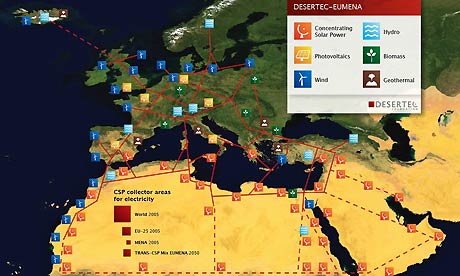 Solar power from Sahara a step closer Huge £35bn supergrid would pool green sourcesNov 1 , 2009 - Ashley Seager - The Guardian
A $400bn (£240bn) plan to provide Europe with solar power from the Sahara moved a step closer to reality today with the formation of a consortium of 12 companies to carry out the work. The Desertec Industrial Initiative (DII) aims to provide 15% of Europe's electricity by 2050 or earlier via power lines stretching across the desert and Mediterranean sea. The German-led consortium was brought together by Munich Re, the world's biggest reinsurer, and consists of some of country's biggest engineering and power companies, including Siemens, E.ON, ABB and Deutsche Bank. It now believes the DII can deliver solar power to Europe as early as 2015. "We have now passed a real milestone as the company has been founded and there is definitely a profitable business there," said Professor Peter Höppe, Munich Re's head of climate change. "We see this as a big step towards solving the two main problems facing the world in the coming years - climate change and energy security," said Höppe. The solar technology involved is known as concentrated solar power (CSP) which uses mirrors to concentrate the sun's rays on a fluid container. The super-heated liquid then drives turbines to generate electricity. The advantage over solar photovoltaic panels, which convert sunlight directly to electricity, is that if sufficient hot fluid is stored in containers, the generators can run all night. The technology is not new - there have been CSP plants running in the deserts of California and Nevada for two decades. But it is the scale of the Desertec initiative which is a first, along with plans to connect North Africa to Europe with new high voltage direct current cables which transport electricity over great distances with little loss. Leading European energy industry expert Paul van Son has been appointed chief executive of DII and will recruit staff to build up a framework to make the building of both power plants and the grid infrastructure. "We recognise and strongly support the Desertec vision as a pivotal part of the transition to a sustainable energy supply in the Middle East, North Africa and Europe," he said. "Now the time has come to turn this vision into reality. That implies intensive cooperation with many parties and cultures to create a sound basis for feasible investments into renewable energy technologies and interconnected grids." Desertec has gained broad support across Europe, with the newly elected German coalition government of Angela Merkel hoping the project could offset its dependence on Russian gas supplies. North African governments are said to be keen, too, to further exploit their natural resources. Algeria and Libya are already big oil and gas suppliers to Europe. Höppe said Munich Re had been concerned about the potential impact of climate change on the insurance business since the early 1970s. Extreme weather events related to climate change are already a reality and have the potential to be uninsurable against within a few decades, pointing to a possible crisis for the industry, he said. "To keep our business model alive in 30 or 40 years we have to ensure things are still insurable," he said. Munich Re also plans to invest in the new initiative and Höppe said banks were confident that they could raise sufficient funding to make the project work. There are already some small CSP plants in Spain and North Africa, with the power used locally. But Desertec plans to see big power stations of one gigawatt operating in five years' time and exporting some current across the Mediterranean. The consortium stresses, though, that power generated by solar fields in North Africa would be used by North Africans as well as Europeans. North Africa has a small population relative to the size of its deserts. For similar reasons Australia is putting together its own Desertec initiative. Dan Lewis, head of a new thinktank, the Economic Policy Centre, and author of a forthcoming energy policy paper, said: "This is just the sort of long-term, big-difference, energy security gain project that our UK short-term targets and policy framework can't deliver. "Instead, we're spending ridiculous sums on no-hoper, marginal stuff like fusion energy and a massive smart meter rollout, that at best will only shave a fraction off peak demand." |
Email this page to a friend
If you speak another language fluently and you liked this page, make
a contribution by translating
it! For additional translations check out FreeTranslation.com
(Voor vertaling van Engels tot Nederlands)
(For oversettelse fra Engelsk til Norsk)
(Для дополнительных
переводов проверяют
FreeTranslation.com )


